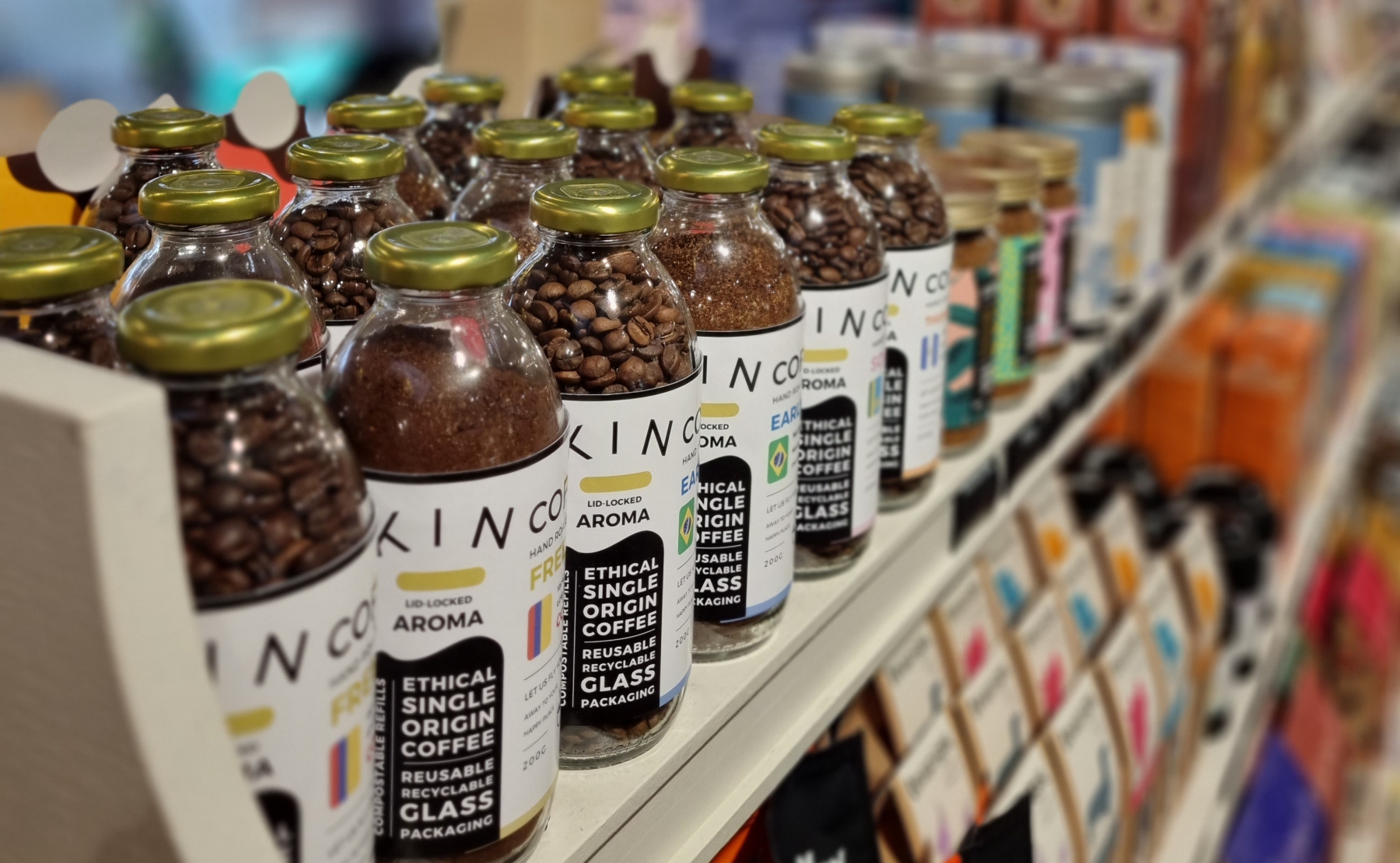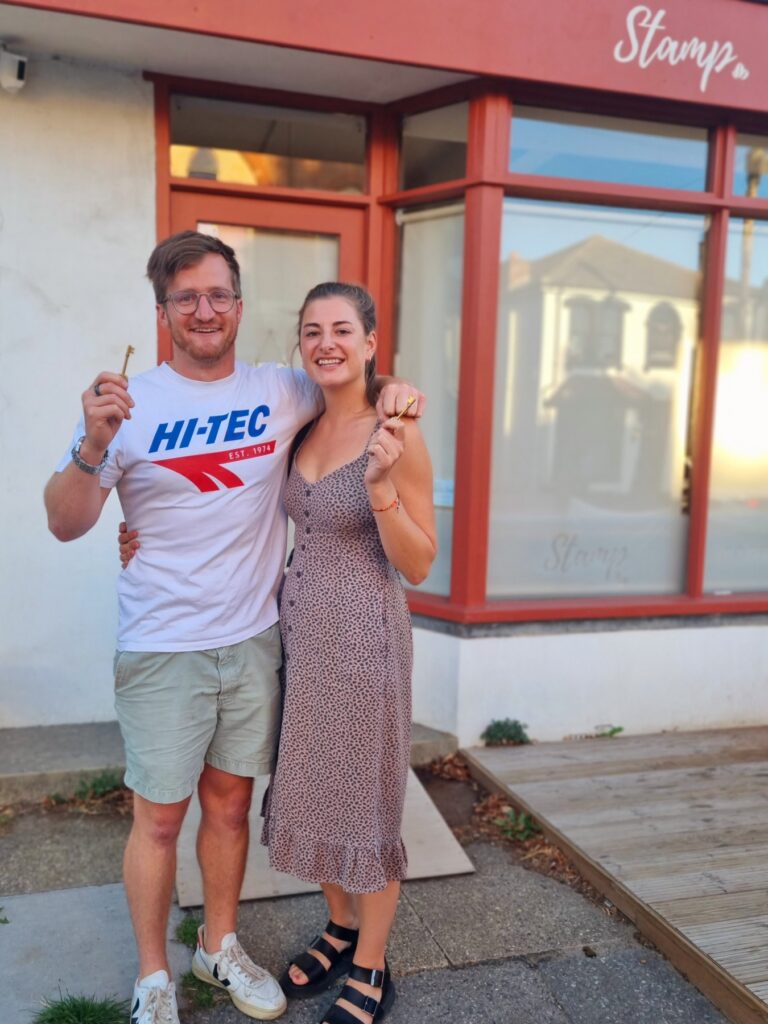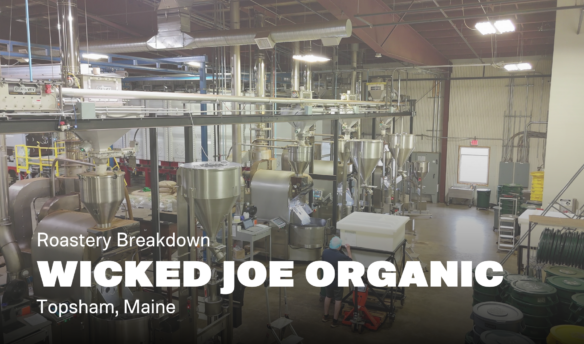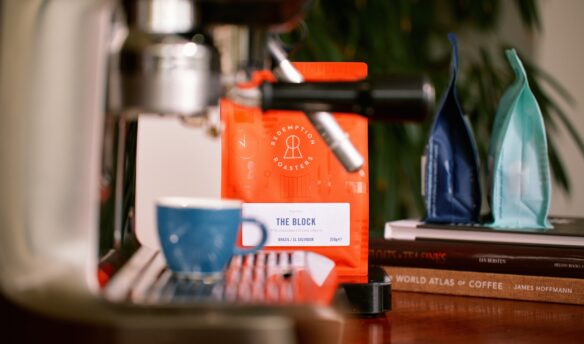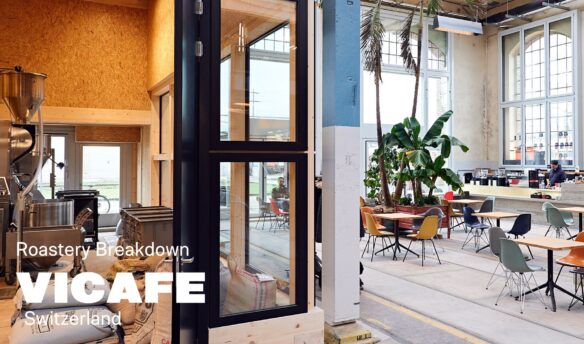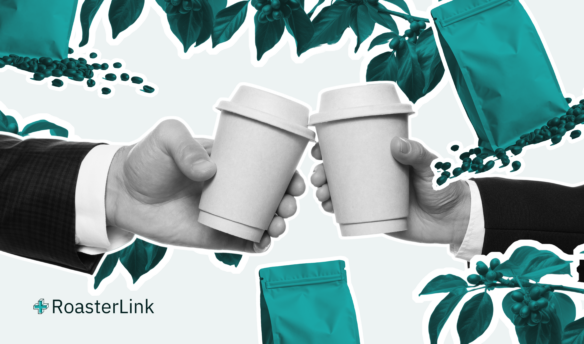Founded at the beginning of the COVID-19 pandemic, Kin Coffee in rural Kent, UK, is a small coffee roaster tackling the challenges of creating and running a sustainable business. Started in a repurposed shed in a family member’s backyard, Kin was named by The Times (London) as one of five game-changing coffee brands in the UK to watch in October 2021 for offering whole bean and ground coffee in reusable glass containers.
But the path to sustainability is filled with trial and error, admit founders Gregory Salmon and Kate Frost. It took “extensive research and being a bit bullheaded,” says Salmon. While some solutions are simple—shredding used cardboard to repurpose as packaging for products during shipping or making bags, pillows, and seat covers from old burlap bags—some problems, like sourcing environmentally-friendly packaging, are not quite as easy to solve.
Cracking The Packaging Problem
As they prepared to sell their coffee at local farmer’s markets, the duo knew using recyclable packaging was non-negotiable. “We started buying ‘fully recyclable’ plastic pouches but discovered they were level 4 recycling (low-density polyethylene, or LDPE), which is the type you have to take to a specialist facility,” says Salmon. This led to a lot of “wish-cycling,” according to Salmon; many of their customers assumed bags were fully recyclable because of the symbol on the bag, so they tossed them into their home recycling bins, unaware of the specialized treatment these products require.
Wish-cycling, or the practice of recycling items that cannot be recycled, is a global problem. According to UK-based WRAP (The Waste and Resources Action Programme), in a 2021 survey, 85% of UK households put one or more items into their recycling that they assume are recyclable. In 2019, 25% of US households did the same. Wish-cycling non-recyclable things lead to contamination at recycling plants, often resulting in recycling loads being dumped in landfills. According to climate scientists, improper recycling is becoming a global crisis and is dramatically impacting greenhouse gas emissions.
With this in mind, Salmon and Frost knew they couldn’t settle on the coffee bags they started with. After extensive research, and aided by Frost’s knowledge from having worked in a glassware import business, they settled on milk-bottle-style glass jars that can be recycled or reused.
But the glass bottles weren’t a perfect solution. “The key problem with glass is it’s really difficult to get anything with a valve,” says Salmon. “And we didn’t want any glass bottles exploding on retail shelves,” Frost says, noting that freshly-roasted coffee degasses over time and a one-way valve is necessary to prevent pressure from building up inside the glass.
Frost says that the first valves they purchased were a mistake: thick plastic stick-on valves affixed to the jar’s metal lids that weren’t recyclable at home. The valves were also labor-intensive for the duo: they had to punch a hole in each top, then affix the valve with a food-safe glue.
But frustration leads to change. “We knew there were these sticker valves we wanted, but you had to order 78,000 at a minimum,” says Frost. “But we were very persistent” and kept asking for samples to see if they would work. When they finally received them, “that was the game changer.”
The new valves, Flexis™ One-Way Coffee Valves, use 90% less plastic than the standard hard valve and are very thin, with a three-layer secure seal. Now fully recyclable, the whole container is also reusable, with some of their customers reporting they use them for at-home food fermentation.
The Search For Better Packaging
Kin still needed a small, lightweight pouch for their monthly subscription service, where they ship customers coffee through the mail. They found a biodegradable pouch, which was less expensive to mail than a glass jar, allowing customers to pour the ground coffee or beans from the pouch into their Kin coffee jar. The plastic pouch they initially settled on is home-compostable and made from cellulose derived from renewable wood pulp. But this environmentally-friendly option still had drawbacks.
The compostable bags take about six weeks to break down. The decomposition rate is slower in the winter, while the summer heat causes the bags to get oily, and decomposition happens more quickly. Additionally, if the bags get wet, the packaging will break down, which is a big problem if there’s still coffee in the bags—it needs to be decanted immediately. But, as Frost and Salmon note, if the bags end up in a landfill, they’re not putting more plastic into the ground. Salmon states that eliminating that bit of plastic is “the key takeaway: it’s the best we can do at the moment.”
Since our initial interview with Kin, they have moved to another solution for mail-order customers and farmer’s market purchasers: paper pouches, a change made after their search for larger paper pouches for their wholesale clients. They started searching for a paper bag with a compostable valve to use at wholesale, while finding that the same valve issue exists for paper coffee bags as for the glass jars: finding a degassing valve that the end user can recycle proved problematic here as well.
Frost stresses they’ve approached each new challenge “one problem at a time” while continually searching for better eco-friendly products that come into the market.
Through The Bag Broker UK, Kin found the paper coffee bags they now use for retail and larger bags for wholesale. The bags, made from compostable kraft paper, wood pulp, and sugarcane sealant film, are made with non-fossil fuels and are fully compostable at home and with industrial food waste (though not recyclable). “They’re the only place in the world that does them,” says Salmon, “as far as I’m aware.”
Packaging For The Future
What do Frost and Salmon envision for the future of Kin? They’ve just moved operations out of the garden shed into a coffee shop with a roasting facility. They will continue their eco efforts while keeping an eye on changes in the industry. They plan to start recycling coffee grounds into coffee bricks through a company like Bio-bean and are investigating purchasing a larger, more environmentally friendly roaster—but they’re taking things one step at a time.
They’re seeing a lot of movement in packaging options, including compostable and recyclable plant-derived bags. “We’re not alone in what we’re feeling,” says Frost. “There’s definitely been a movement to get coffee bags into something that, for the end user, is easily recycled and composted. You start from the beginning, make those small steps, and everything adds up.”
The duo will continue to set high standards for Kin. “We’re almost at the point of being zero waste,” says Salmon. They compost all of their chaff, recycle all cardboard, use spare burlap coffee bean bags in the garden to plant things like tomatoes, and even sell them to people wanting to use them for sack races at home.
“As long as you’ve got a clear guiding light of what you’re after,” says Salmon, “you’ll find the solution.”



